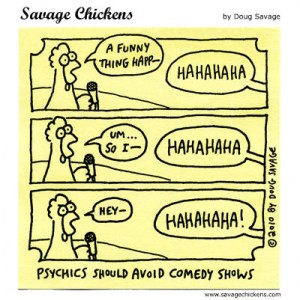This Sunday February 19, 2012 we will begin our new “You Decide” radio talk show featuring a wonderful comedic guest host and very talented actor Peter Kelamis!
 Our special guest announcement will be made this evening after we share with you what the theme with be all about; Comedy, and how it can be used in real life to get along with other people with a minimum of friction using comedy presented in a thoughtful manner.
Our special guest announcement will be made this evening after we share with you what the theme with be all about; Comedy, and how it can be used in real life to get along with other people with a minimum of friction using comedy presented in a thoughtful manner.
Below are a few examples of humor (positive and negative):.
• A young blonde woman is distraught because she fears her husband is having an affair, so she goes to a gun shop and buys a handgun. The next day she comes home to find her husband in bed with a beautiful redhead. She grabs the gun and holds it to her own head. The husband jumps out of bed, begging and pleading with her not to shoot herself. Hysterically the blonde responds to the husband, ”Shut up…you’re next!
• I said to the Gym instructor “Can you teach me to do the splits?” He said, ”How flexible are you?” I said, ”I can’t make Tuesdays.
• I’m on a whiskey diet. I’ve lost three days already.
• A man walks into a bar with a roll of tarmac under his arm and says: ”Beer please, and one for the road.
• My mother-in-law fell down a wishing well, I was amazed, I never knew they worked.
• A woman has twins, and gives them up for adoption. One of them goes to a family in Egypt and is named ‘Amal.’ The other goes to a family in Spain, they name him Juan’. Years later; Juan sends a picture of himself to his mum. Upon receiving the picture, she tells her husband that she wished she also had a picture of Amal. Her husband responds, ”But they are twins. If you’ve seen Juan, you’ve seen Amal.
• I slept like a log last night…….. and woke up in the fireplace.
Did you laugh at any of the jokes? Did you feel mild amusement, or did some of the jokes just not reach you? Why do some jokes make us laugh while others seem stupid, and some even offensive?
Comedy is an art and not a science. There are no rules when it comes to joke telling. Therefore, it can be very subjective. What one person finds funny, another person might cringe at. One thing worth noting is that when we try to figure out what is funny, it seems as if it is just visible out of the corner of your eye
As soon as you try to look directly at it and attempt to analyse it, the humour disappears.
Why do we find things funny? There really is no simple answer. If you ask a comedian, he or she will likely tell you they do not know either. However, if it has to be quantified, perhaps the following will help:
Comedian Dave Chapelle was once a guest on the television program “Inside the Actor’s Studio”. James Lipton, the very serious appearing host, played a clip from Chapelle’s film, “Half Baked” and remarked with all seriousness.
That was a remarkable piece of acting. A moment of silence passed between them, then Chapelle often exploded into a torrent of laughter.
Such an outburst is a perfect example of E.B White’s assertion that, “analyzing humour is like dissecting a frog. Few people are interested and the frog dies in the end”.
A growing number of academics in disciplines such as psychology, history and philosophy have dedicated research to understanding exactly what makes some things funny.
Some believe that humour is psychologically driven by the people around us. Charles Darwin himself suggested that humour , “is a crucial social cohesive, one of the primal forces that has bound tribes together throughout evolution”. Studies show that we are thirty times more likely to laugh in the company of others than we are alone.
Another explanation for humour comes from the “Incongruity Theory” (Henri Bergson). This theory holds that we laugh when we are surprised. Neurologically, we are hard wired to expect certain patterns in behaviour and storytelling.
When a joke bucks these expectations, the brain is forced to perceive an idea in two separate frames of mind; a sort of tickle for the brain.

For example, “how do you get a philosopher off your porch? You pay him for the pizza”. The punch line twists your preconceptions about philosophers as stodgy old academics and suggests that philosophy may not lead to a lucrative career choice.
A third theory for humour is called the “Superiority Theory” also from Henri Bergson. This theory claims that we laugh in the face of other people’s misfortune. An example of this is the dumb blonde joke.
The “Relief Theory” (Sigmund Freud) asserts that ‘funny’ is derived from the relief from tension. In one

study, a group of scientists deliberately startled test subjects with a very convincing fake rat, eliciting a lot of relieved laughter.
The “Benign Violation Theory” (Peter McGraw) argues that we laugh when we are harmlessly violated. This could mean anything from tickling, which most people hate but still laugh at, to vulgar stereotype humour based on race, sex and bodily functions.
Our laughter hinges on our being properly distanced from the violation. For example, we do not laugh when we tickle ourselves but we will laugh when the tickling is done by a friend.
To add to the confusion, our concept of what is funny changes over our lifetimes. At one point in our lives, armpit farting noises were the pinnacle of hilarity. At age five, nothing else could possibly top it.
For some of us, usually the male side of the species, nothing else ever will. But for most people, what strikes us as funny changes drastically over time. Teenagers are statistically most likely to laugh out loud at slapstick humour. Their parents, people in their forties and fifties, find life’s ups and downs
to be the best source of a chuckle. Adults do a whole lot less laughing than do children.
A recent study in Britain uncovered a somewhat bleak condition called the “Victor Meldrew Syndrome” about a curmudgeonly character with no sense of humour,which illustrates a law of diminishing laughter.
Where children let lo ose an astounding 300 times a day, adolescence reduces that number to six. By the time we reach adulthood, we clock in at a mere three or four laughs from morning to night. What it is about age that numbs our funny bone is a bit of a mystery. It could be that personal experiences remove some of the humour. After all, if you’ve heard a joke three or four times, it stops being funny.
ose an astounding 300 times a day, adolescence reduces that number to six. By the time we reach adulthood, we clock in at a mere three or four laughs from morning to night. What it is about age that numbs our funny bone is a bit of a mystery. It could be that personal experiences remove some of the humour. After all, if you’ve heard a joke three or four times, it stops being funny.
Finally, a study from Tufts University in Medford, MA. found that those watching a good comedy got a temporary boost to their health. Those who laughed their way through a funny film had improved circulation, just as if they had been exercising.
Another group in the study, whose members had to watch a stressful film actually experienced poorer circulation than they had before the film; further proving the healthful benefits of laughter.
Ultimately, we may not know the exact reason for what makes something funny, but one thing we do know is that it is innate. After all, people who are born deaf and blind are able to laugh without having ever seen or heard it done. So whatever our internal motivation to laugh, it is probably best not to over-think it. Just sit back, grin and enjoy it. Laughter is the best medicine for us all.
 Thanks to Kenn for staging the still images and video in this post for me, and thanks to you for stopping by WormholeRiders News Agency!
Thanks to Kenn for staging the still images and video in this post for me, and thanks to you for stopping by WormholeRiders News Agency!
Please feel free to leave a comment here, click an icon below to share this interview, or you can visit and follow me on Twitter by clicking on my avatar to the right.
Regards,
Thank you.
ArcticGoddess1 (Patricia)





